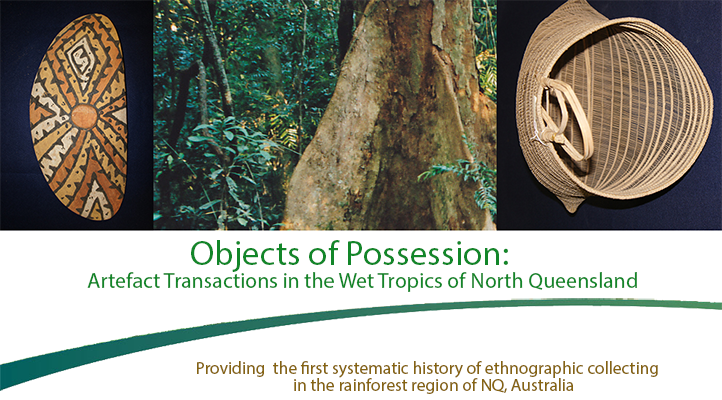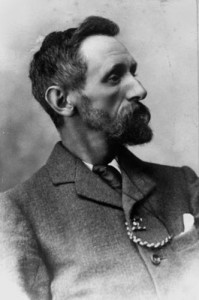Author: Russell McGregor
Collector: Clement Lindley Wragge
Born: 18 September 1852 in Stourbridge, Worcestershire, England
Died: 10 December 1922 in Birkenhead, New Zealand
Active: Most of Wragge’s ethnographic collecting in Queensland was done in the 1890s. In the Wet Tropics, he collected in the coastal strip between Cardwell and Cairns.
Background biography: Clement Wragge is best known as a meteorologist, especially for initiating the naming of tropical cyclones. Wragge started this practice in the 1890s, naming cyclones after figures as varied as the ancient heroes Xerxes and Hannibal and the contemporary politicians Edmund Barton and Alfred Deakin. However, the practice was discontinued in the early twentieth century and resumed only in 1964. Wragge not only named tropical cyclones; they were his special field of professional interest and he devoted much of his life to understanding their origins and trajectories. His own life was as turbulent as the cyclones he studied.
Orphaned at the age of five, Wragge later attended Thomas Alleyne’s Grammar School at Uttoxeter, then studied law at Lincoln’s Inn in London. Shortly after his twenty-second birthday, he embarked on travels that took him around the world, to Egypt, India, Australia, the United States of America and other countries between. On a second visit to Australia, he married Leonora Thornton in Adelaide on 13 September 1877, and sailed back to Britain the following year. Retrained as a meteorologist, he returned to Adelaide in 1884 and was a leading figure behind the creation of the Royal Meteorological Society of Australasia. On 1 January 1887 he was appointed Government Meteorologist for Queensland, in which role he worked for sixteen controversy-filled years until he resigned in 1903.
As well as being a meteorologist, Wragge was a collector of ethnographic objects, including artefacts from the Queensland Wet Tropics. In 1899 he sold to the South Australian Museum some of the artefacts he had collected in Queensland over the preceding decade. These include three large, painted shields from the Tully River; seven wooden swords from the region between Cardwell and Cairns; ten baskets from the Cardwell district, some made of closely-woven grass, others of split lawyer-cane in typical bicornual shape; plus a boomerang and a necklace also from Cardwell. In 1900 the Queensland Museum acquired from Wragge a large ‘ethnological collection’, mainly of items from Queensland. Museum records give conflicting information on whether Wragge donated or sold this collection. Museum Victoria in Melbourne also holds a number of artefacts from the Wet Tropics collected by Wragge.
Wragge established two museums in his own lifetime. One was the Wragge Institute and Museum in Auckland, New Zealand, where he had moved after failing to secure the position of Commonwealth Meteorologist in Australia. The other was in English town of Stafford, where he founded the Wragge Museum of Ethnography, Geology and Natural History, which according to the Sydney Morning Herald in 1922 ‘included a fine collection of native Australian weapons’.
Wragge was a Theosophist who practised yoga and late in life turned to the occult and spiritualism. Despite these otherworldly leanings, he is reputed to have had an explosive temper and swear like a bullock-driver. He was an advocate of nature conservation and an exponent of physical fitness, but was also an eccentric and irascible man. His ethnographic collecting was not likely motivated by a desire for financial reward (he was a quite wealthy man of independent means) but rather by fascination with cultures other than his own. He admired Pacific Islanders, but seems to have regarded Aboriginal people with aloof detachment.
Sources: Queensland Museum: Correspondence folder, 1900, Anthropology Laboratory.
Queensland Museum: Old Purchase Register, 1883-1907.
Sydney Morning Herald, 11 December 1922, p.10, http://trove.nla.gov.au/ndp/del/printArticlePdf/16036182/3?print=n
Paul D. Wilson, ‘Wragge, Clement Lindley (1852–1922)’, Australian Dictionary of Biography, National Centre of Biography, Australian National University, http://adb.anu.edu.au/biography/wragge-clement-lindley-9193/text16237
South Australian Museum, Digital Collections: Australian Aboriginal Culture, http://www.samuseum.sa.gov.au/collections/digital-collections/australian-aboriginal-culture

